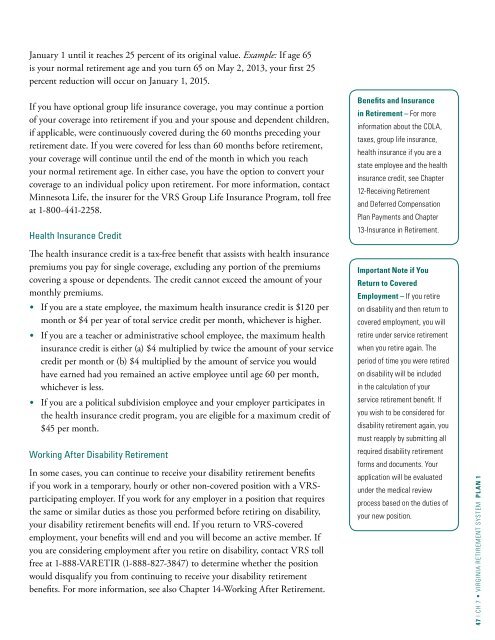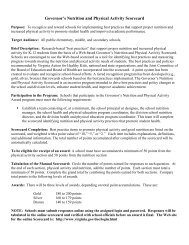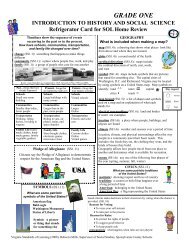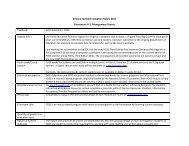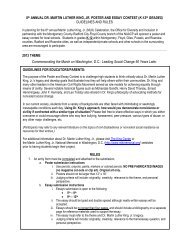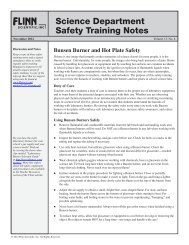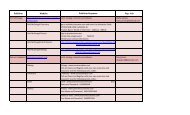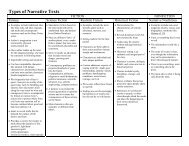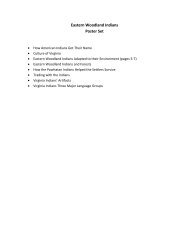VRS Handbook for Members - Virginia Retirement System
VRS Handbook for Members - Virginia Retirement System
VRS Handbook for Members - Virginia Retirement System
You also want an ePaper? Increase the reach of your titles
YUMPU automatically turns print PDFs into web optimized ePapers that Google loves.
January 1 until it reaches 25 percent of its original value. Example: If age 65<br />
is your normal retirement age and you turn 65 on May 2, 2013, your first 25<br />
percent reduction will occur on January 1, 2015.<br />
If you have optional group life insurance coverage, you may continue a portion<br />
of your coverage into retirement if you and your spouse and dependent children,<br />
if applicable, were continuously covered during the 60 months preceding your<br />
retirement date. If you were covered <strong>for</strong> less than 60 months be<strong>for</strong>e retirement,<br />
your coverage will continue until the end of the month in which you reach<br />
your normal retirement age. In either case, you have the option to convert your<br />
coverage to an individual policy upon retirement. For more in<strong>for</strong>mation, contact<br />
Minnesota Life, the insurer <strong>for</strong> the <strong>VRS</strong> Group Life Insurance Program, toll free<br />
at 1-800-441-2258.<br />
Health Insurance Credit<br />
Benefits and Insurance<br />
in <strong>Retirement</strong> – For more<br />
in<strong>for</strong>mation about the COLA,<br />
taxes, group life insurance,<br />
health insurance if you are a<br />
state employee and the health<br />
insurance credit, see Chapter<br />
12-Receiving <strong>Retirement</strong><br />
and Deferred Compensation<br />
Plan Payments and Chapter<br />
13-Insurance in <strong>Retirement</strong>.<br />
The health insurance credit is a tax-free benefit that assists with health insurance<br />
premiums you pay <strong>for</strong> single coverage, excluding any portion of the premiums<br />
covering a spouse or dependents. The credit cannot exceed the amount of your<br />
monthly premiums.<br />
• If you are a state employee, the maximum health insurance credit is $120 per<br />
month or $4 per year of total service credit per month, whichever is higher.<br />
• If you are a teacher or administrative school employee, the maximum health<br />
insurance credit is either (a) $4 multiplied by twice the amount of your service<br />
credit per month or (b) $4 multiplied by the amount of service you would<br />
have earned had you remained an active employee until age 60 per month,<br />
whichever is less.<br />
• If you are a political subdivision employee and your employer participates in<br />
the health insurance credit program, you are eligible <strong>for</strong> a maximum credit of<br />
$45 per month.<br />
Working After Disability <strong>Retirement</strong><br />
In some cases, you can continue to receive your disability retirement benefits<br />
if you work in a temporary, hourly or other non-covered position with a <strong>VRS</strong>participating<br />
employer. If you work <strong>for</strong> any employer in a position that requires<br />
the same or similar duties as those you per<strong>for</strong>med be<strong>for</strong>e retiring on disability,<br />
your disability retirement benefits will end. If you return to <strong>VRS</strong>-covered<br />
employment, your benefits will end and you will become an active member. If<br />
you are considering employment after you retire on disability, contact <strong>VRS</strong> toll<br />
free at 1-888-VARETIR (1-888-827-3847) to determine whether the position<br />
would disqualify you from continuing to receive your disability retirement<br />
benefits. For more in<strong>for</strong>mation, see also Chapter 14-Working After <strong>Retirement</strong>.<br />
Important Note if You<br />
Return to Covered<br />
Employment – If you retire<br />
on disability and then return to<br />
covered employment, you will<br />
retire under service retirement<br />
when you retire again. The<br />
period of time you were retired<br />
on disability will be included<br />
in the calculation of your<br />
service retirement benefit. If<br />
you wish to be considered <strong>for</strong><br />
disability retirement again, you<br />
must reapply by submitting all<br />
required disability retirement<br />
<strong>for</strong>ms and documents. Your<br />
application will be evaluated<br />
under the medical review<br />
process based on the duties of<br />
your new position.<br />
47 | CH 7 • VIRGINIA RETIREMENT SYSTEM Plan 1


